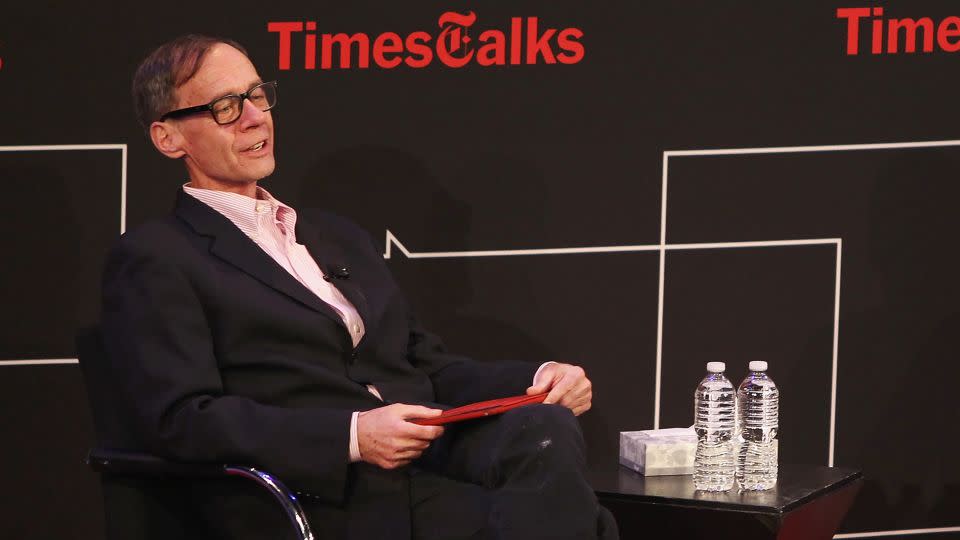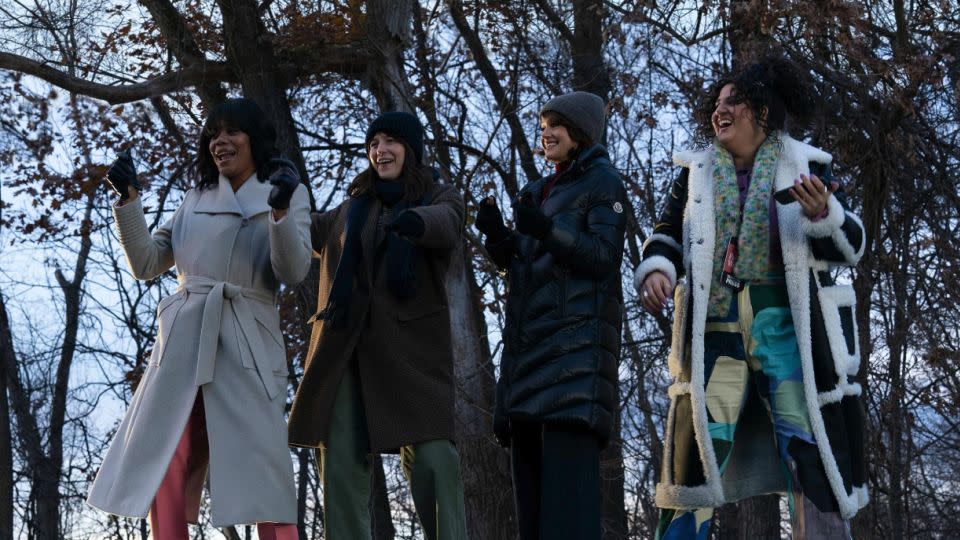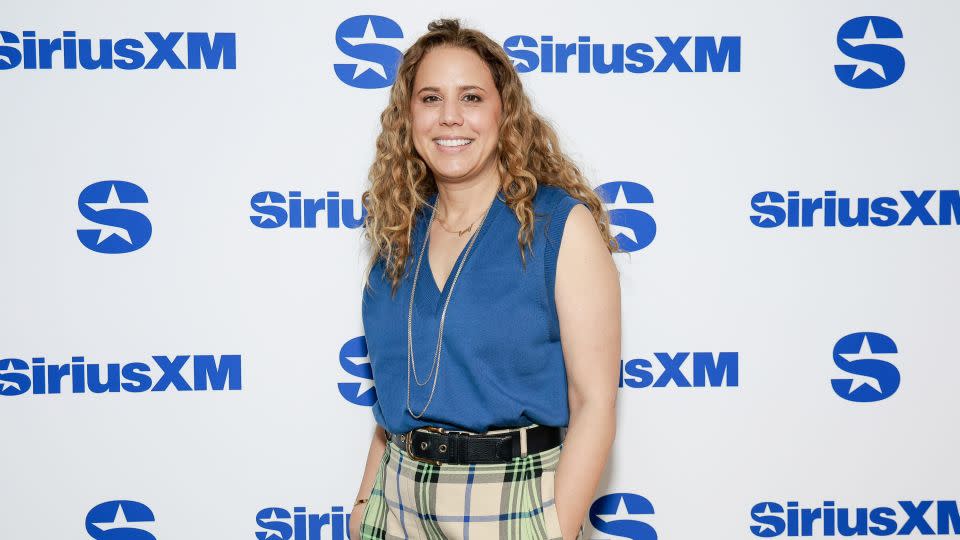Amy Chozick spent years covering Hillary Clinton. Now, she tells her own story through ‘The Girls on the Bus’
After spending nearly a decade covering Hillary Clinton, including both of her presidential campaigns, former New York Times White House correspondent Amy Chozick felt she had another story to tell: her own.
When she began to write her memoir “Chasing Hillary,” which chronicled time on the road with the Clinton campaign, Chozick said she struggled at first to write about her personal experiences and perspectives after so many years covering news events. Chozick credits her mentor, the late legendary Times columnist and editor David Carr, for helping her find her voice.
“You have to go to a magical place where writers live, you have to put newspaper writing out of your head,” Carr advised, according to Chozick, who spoke to CNN in a recent interview about the new Max series “The Girls on the Bus,” which debuted Thursday and is based on Chozick’s memoir. (Max and CNN share the same parent company, Warner Bros. Media.)
With Carr’s advice in mind, the words that would become the series’ source material began to flow. Chozick said her story is about how “a woman trying to become the first woman president took over the formative years of my 20s and 30s.”
After it published in 2018, “Chasing Hillary” caught the attention of veteran TV producers Greg Berlanti, Julie Plec and Rina Mimoun, who went on to partner with Chozick and Max to adapt the project for television, inspired mostly by one particular chapter that nodded to Tim Crouse’s 1973 book, “The Boys On The Bus.”
Starring Melissa Benoist, “The Girls on the Bus” follows four female journalists as they cover a fictional presidential campaign. While the series is not biographical, it is informed by Chozick’s experiences, which honor a version of Carr, highlight social issues relevant today and celebrate the depths of female friendship.
“This was the truth that I wanted to tell,” Chozick said of the series. “It was very deeply tied to my own emotional journey and arc.”
Carr’s influence
David Carr was an influential media personality who wrote the “Media Equation” column for The New York Times. He died at age 58 from complications from lung cancer and heart disease after he collapsed at The Times office in Manhattan in 2015, CNN reported at the time.
In “Chasing Hillary,” Chozick recalls the importance of Carr’s mentorship in helping shape her career through anecdotes of ramen dinners the two would share and the eventual “polar bear” nickname she earned from him. Much of that is portrayed in “Girls on the Bus,” through the character Bruce Turner (Griffin Dunne), who is an editor for the show’s fictional New York-based paper called The Sentinel.
“Bruce is very much inspired by David but he’s also inspired by other editors,” Chozick said, referring to two of her other “favorite curmudgeonly editors” she worked with and named the composite character after. “So I think he’s a mix of all of the sort of mentors and editors I’ve been lucky enough to have.”

Turner’s relationship with Sentinel campaign reporter Sadie McCarthy (Melissa Benoist) rests at the center of “Girls on the Bus.” Like Carr was to Chozick, Turner is showcased as a sort of father figure to McCarthy as he guides her through breaking a big campaign story.
“The relationship between a journalist and editor is so intense, especially when you’re out on the road,” Chozick said. “That’s the only person back at the mothership fighting for you, protecting you. So, it was just such a deep relationship.”
Benoist told CNN that she learned about Carr through reading “Chasing Hillary” and Carr’s own 2008 memoir “The Night of the Gun.” She said she “wanted to do right” by Chozick in representing their dynamic.
“It was a relationship that I think meant a lot to her, that was really informative and formative of herself not just as a journalist, but as a person,” Benoist said.
Amplifying female friendship
Benoist’s character and reporting are also shaped by the friendships she develops with the other female journalists in “Girls on the Bus,” played by Natasha Behnam, Carla Gugino and Christina Elmore. The characters were inspired by the traveling press corps – almost all women – who were on Clinton’s 2016 campaign.
On the show, these characters with diverse backgrounds begin as competitors but ultimately come together while navigating love, loss and the turbulence of modern American politics.
Showrunner Rina Mimoun told CNN in an interview that the producers were “committed to telling stories about female friendship, mostly because they really are just so few and far between.”
“I think it’s just the gift of this show is to allow women to celebrate their relationships together,” Mimoun said. “There’s an episode where all the girls wind up piled together in Sadie’s bed at the end and it’s wishful. It’s like, I want those girls. I want that friendship. I miss that time in my life when I had it.”

“In real life, we got very lucky to love each other,” Behnam told CNN. “When it came to bringing that into the show – like these women becoming friends despite their differences and how do they bond – it was a lot easier because we were having so much fun.”
Benoist agreed, saying, “Whatever cosmic energy brought the four of us together, it was pretty awesome.”
Rewriting history
While “Girls on the Bus” was sparked by Chozick’s experience on Clinton’s 2016 campaign and former President Donald Trump’s eventual victory, the showrunners agreed they wanted to create new stories for the series, rather than revisit that specific election.
“When we started talking about it, one of the things we talked about the most was this sense of what culpability does mainstream media need, did the mainstream media have in the way that this election played itself out,” producer Julie Plec said in an interview with CNN.
As a producer on “Girls on the Bus,” Chozick recognized the opportunity she had with the series to create scenes based on conversations she never got to have with key people she encountered on the campaign trail. She said the project allowed her to work through her lingering “neuroses” about how she covered the 2016 election.

Rewriting her own personal history through a fictional TV series is an opportunity that Chozick admits she didn’t see coming. She certainly did not expect to go from aspiring poet to Clinton campaign reporter to bestselling author to executive producer of a Max show, yet, here she is.
“I couldn’t have imagined a scenario where the world ended up the way it did,” she said. “I’m so grateful just personally for me that it did because it’s been incredibly fulfilling to turn those experiences into these fictional characters that we love so much.”
“The Girls on the Bus” is available to stream now on Max.
For more CNN news and newsletters create an account at CNN.com


